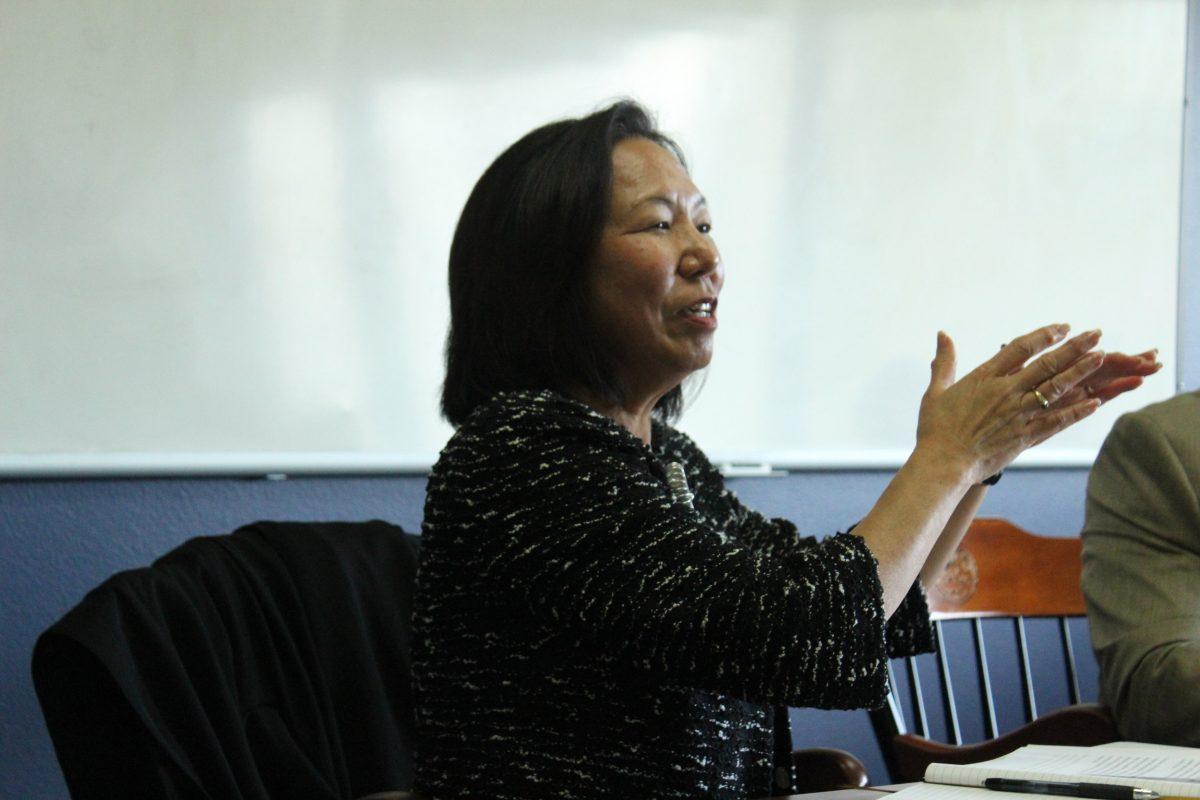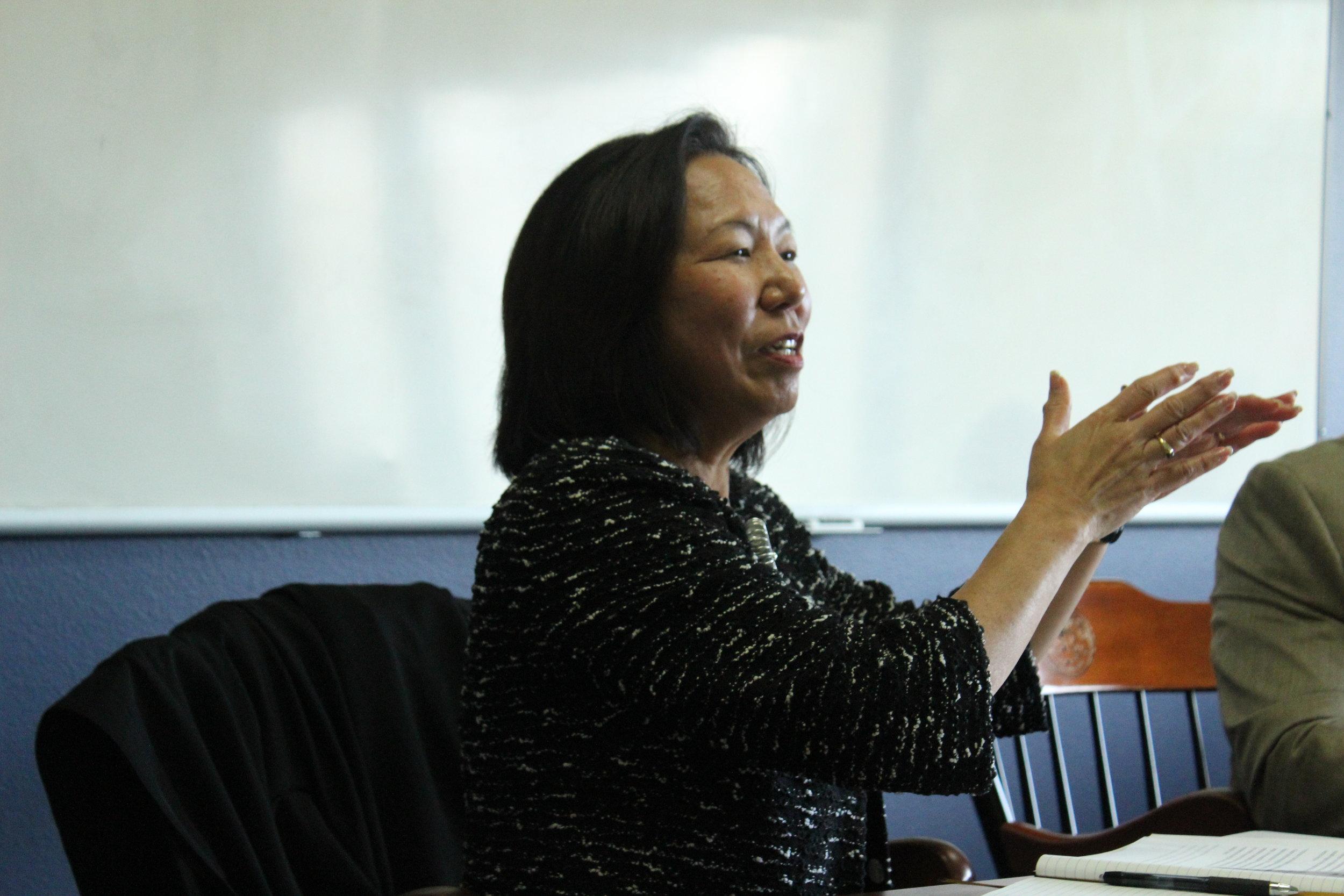In a Jan. 31 statement, Sonoma State University President Judy Sakaki declared her support for undocumented and immigrant students in the aftermath of President Donald Trump’s executive orders.
Sakaki expanded on this initial promise at a meeting in Salazar Hall Friday, where she spoke with the Alianza for Equity about issues such as retention rates, on-campus diversity and Sonoma State’s status as a Hispanic Serving Institution.
Sakaki opened the meeting by saying she cares “a great deal about equity issues” and that she noticed a lack of support systems when she began her position at Sonoma State.
“My whole career has been focused on access, affordability, and equity,” Sakaki said.
Sakaki said it is important for Sonoma State to work with families to recruit more diverse and underrepresented students, adding that an outreach counselor helped her to achieve her current position.
“Sonoma State is a place [where] we not only want you, but you will be successful once you get here,” Sakaki said.
When asked how she plans to increase the student body’s diversity, Sakaki said Sonoma State will need to improve efforts with its Human Resources Department, outreach programs and committees to keep track of openings for underrepresented applicants.
“We do know that we’re going to have to work together and think together about that,” Sakaki said.
Sakaki said that she worked to more quickly advance the process toward eligibility as an official Hispanic serving institution, and that this status will open many new possibilities for Sonoma State.
“It puts us on the road map. It opens up many doors for us, for grants that we might not have been eligible for,” Sakaki said.
Bill Kidder, associate vice president and chief of staff for the Office of the President, said Sonoma State is looking at “the beginnings of an integrated sponsored awards and research office” that would accept both pre-awards and post-awards.
“That’s an opportunity to leverage greater capacity,” Kidder said. “This is one area where we need to grow our capacity far beyond what is in our comfort zone based on the past.”
Daniel Malpica, chair of the Alianza for Equity, said the organization, which first met in summer 2016, consists of 50 to 60 “concerned” faculty, staff and students who aim to discuss issues that pertain to Sonoma State community of Latino or Hispanic descent.
“I think there’s not sufficient faculty of color [at Sonoma State],” Malpica said. “This is a big, big issue, and we want the president and the administrators to address this.”
Malpica said the meeting was the Alianza for Equity’s first with Sakaki, and served as an opportunity for the Alianza to express their willingness to collaborate with Sonoma State’s president and administration.
“The way we see the organization is sort of like a resource where the president can come and consult and collaborate,” Malpica said.
Elisa Velasquez, psychology department chair and a co-founder of the Alianza for Equity, said Sakaki “made it clear from the beginning” of her commitment to making Sonoma State a Hispanic Serving Institution.
“We want to be a group that works in collaboration with everybody here on campus… making sure Dr. Sakaki’s goals are achieved,” Velasquez said.
The Alianza for Equity started shortly after Velasquez noticed Sonoma State’s Latino faculty-to-student ratio was decreasing since fall 2015, she said.
“We know that the graduation [rate] of underrepresented students is lower than the majority students,” Velasquez said.
Additional staff and advisors for the Educational Opportunity Program, more affordable textbook prices and more diversity-centric classes in Sonoma State’s curriculum would all help more Latino and Hispanic students to successfully graduate, Velasquez said.
Ayala said the Alianza for Equity is still working to clarify its mission statement, which would set up the organization’s vision and goals.
“We need to find common principles on which we agree,” Ayala said. “Otherwise, we’re going to be drawn to different groups and advocacy efforts that are not focused on an agreement.”
Malpica said he and the Alianza for Equity will gladly continue to collaborate with Sakaki.
“I hope it is clear to the president that we are very willing to work with her and her team,” Malpica said, “That we are motivated and very enthusiastic of the direction that she’s leading us, and that in many occasions we want to be in the table as participants when a lot of these very important decisions are taking place.”




































